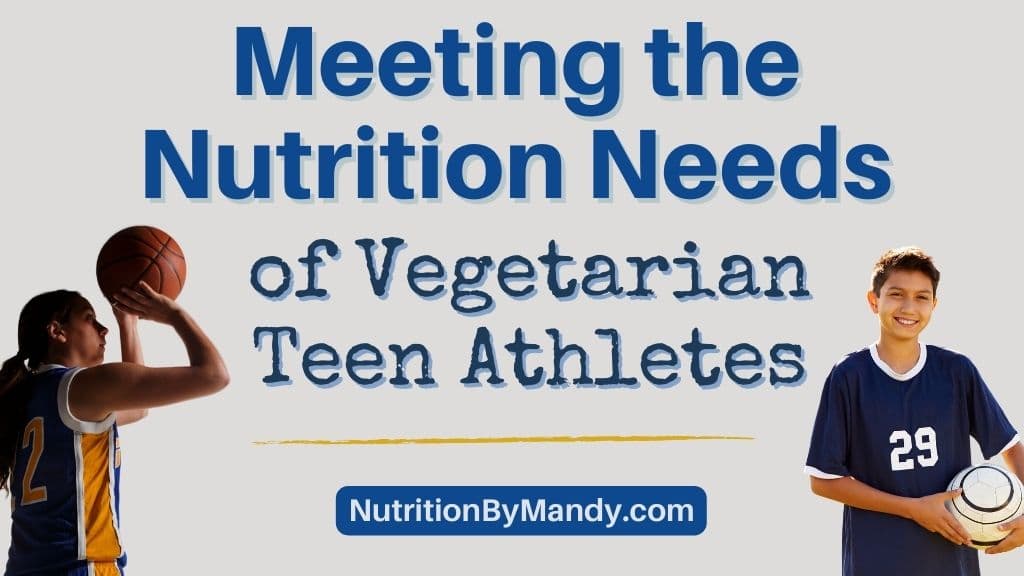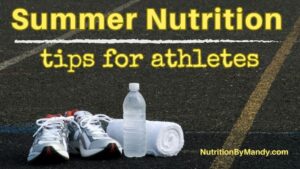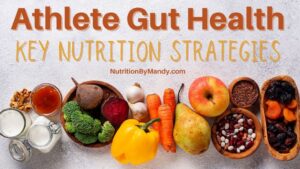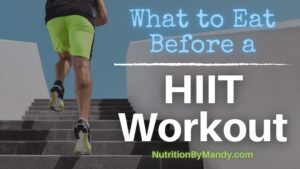Last Updated on July 28, 2023 by Mandy Tyler, M.Ed., RD, CSSD, LD
Meeting the Nutrition Needs of Vegetarian Teen Athletes
This blog post was written by dietetic intern Natalie Larsen. Reviewed and edited by Mandy Tyler, M.Ed., RD, CSSD, LD, LAT.
It is important for teen athletes following a vegetarian diet to know what to eat to support their health and performance goals. Let’s take a look at the different types of plant-based diets that teenage athletes may follow. We will then explore how teen athletes can meet their nutrition needs following a vegetarian diet.
What is a Vegetarian Diet?
Teenage athletes following a vegetarian diet may differ in the types of animal-based products they will include in their meal plan. Thus, it is important to understand the different types of vegetarian diets.
Common terms used to describe different varieties of plant-based diets include (1):
- Vegetarian – Individual avoids all animal and seafood flesh foods (meat, poultry, pork, seafood), may or may not consume dairy or egg products.
- Lacto-vegetarian – Individual follows a vegetarian diet, will consume dairy products, but not eggs or egg products.
- Ovo-vegetarian – Individual follows a vegetarian diet, will consume eggs and egg products, but not dairy products.
- Lacto-ovo-vegetarian – Individual follows a vegetarian diet, will consume dairy and egg products.
- Vegan – Individual will not consume any animal-based products, including eggs, dairy, and sometimes honey.
Understanding the Nutritional Needs of Teen Athletes
The teenage years are a time of physical growth and development. Teen athletes are often expending a high number of calories through sports practices and competitions, strength training and conditioning, as well as normal daily activities.
Thus, the first priority for a teen athlete following a vegetarian diet is to ensure the teen is eating enough calories to support daily energy needs (2). Underfueling, resulting in an imbalance between calories consumed in the diet and expended throughout the day, can negatively impact a teen athlete’s health and sports performance (3).

Protein for Vegetarian Teen Athletes
Consuming adequate protein is important in the diet of teenage athletes following a vegetarian diet. Protein has many important roles in the body and is needed to support athletes with building and maintaining muscle.
Protein is composed of 20 individual building blocks called amino acids. Of the 20 amino acids, 9 are considered essential. The body cannot make the 9 essential amino acids; thus, they must be consumed in the diet (4).
Many plant-based sources of protein are deficient in one or more of the 9 essential amino acids. Vegetarian athletes should aim to eat a variety of plant-based protein sources. This will help to ensure adequate quantities of all of the essential amino acids are included in the athlete’s meal plan (1).
Plant-Based Sources of Protein
There are a variety of ways athletes following a vegetarian diet can add protein to their meals. Here are suggestions for plant-based proteins that teenage vegetarian athletes can enjoy:
- Soy products: Soy milk, tofu, tempeh, edamame
- Quinoa, buckwheat
- Nuts, nut butters
- Seeds, seed butters
- Beans, legumes, and lentils
- Hummus, chickpeas

Essential Nutrients for Vegetarian Teen Athletes
With the absence of animal-based foods in the diet, there are several key nutrients that vegetarian teen athletes need to pay particular attention to. Although these nutrients are more abundant in animal-based foods, with careful planning, vegetarian teen athletes can ensure their meal plan meets all of their nutrition needs (1).
Iron for Vegetarian Teen Athletes
Iron is important in the diet of teen athletes, as it has many essential roles in the body. It is necessary for growth, the formation of connective tissue, maintaining a healthy immune system, and cognitive function. Iron is also necessary to form hemoglobin, which transports oxygen throughout the body and to working muscles during exercise (5).
It is particularly important for female athletes who have started their menstrual cycle to be mindful of their iron intake. Iron needs are increased in female athletes to compensate for the loss of iron in blood from the monthly menstrual cycle (5, 6).
Iron deficiency anemia can impact an athlete’s performance both on the field and in the classroom. Symptoms of iron deficiency anemia include: fatigue, impaired concentration, compromised immune function, and decreased athletic performance (5).
Dietary Sources of Iron
There are two types of dietary iron, heme iron and non-heme iron. Heme iron comes from animal-based sources and is readily absorbed by the body. Non-heme iron is found in plant-based sources and is not as well-absorbed by the body (5).
Plant-Based Sources of Iron for Vegetarian Teen Athletes
It is crucial to educate vegetarian teen athletes on plant-based sources of iron to include in their meal plan. Examples of plant-based iron sources include:
- Beans and Legumes
- Nuts, seeds, raisins, dried fruit
- Dark green leafy vegetables
- Enriched rice, pasta, and bread
- Fortified breakfast cereals
In addition to educating vegetarian teen athletes on plant-based sources of iron, it is important they are aware of steps they can take to enhance its absorption in the body.
Combining foods and beverages containing Vitamin C with plant-based source of iron enhances the absorption of non-heme iron, In addition, cooking food in cast-iron skillets can increase the iron content of food prepared at home (5, 6).
Conversely, phytates and polyphenols (found in beans, grains, legumes, nuts, coffee, and tea) can inhibit the absorption of iron in the body. Calcium also reduces the absorption of iron. Thus athletes should aim to consume calcium containing food and beverages separate from iron-rich foods (5, 6).

Zinc for Vegetarian Teen Athletes
Zinc is a mineral found in a variety of animal and plant-based food sources. Similar to iron, the zinc found in animal foods is highly absorbed by the body, while plant-based sources of zinc are less well absorbed.
In addition, beans, grains, nuts, and seeds, which are commonly consumed in a vegetarian diet, are high in phytates. Phytates are naturally occurring compounds that bind to zinc and inhibit its absorption. To help reduce the binding of phytates to zinc, athletes can soak beans, grains, nuts, and seeds in water for several hours before preparing (1, 6, 8).
Calcium for Vegetarian Teen Athletes
Calcium is a key micronutrient for teen athletes. In the body, calcium supports the development of strong bones and teeth. It is also necessary for proper muscle function, nerve transmission, and the release of hormones in the body (9).
Inadequate calcium intake may be a concern for vegetarian teen athletes that do not consume milk and other dairy products. These athletes should focus on including plant-based sources of calcium in their meal plan (1).
Plant-based sources of calcium are listed below (1, 6, 9).
- Calcium-set tofu
- Calcium fortified plant milks, juices, and breakfast cereals
- Kale, turnip greens, bok choy, Chinese cabbage
- Beans, lentils, seeds, almonds
Vitamin D for Vegetarian Teen Athletes
Vitamin D is necessary for the absorption of calcium and supporting bone health in athletes. In addition, Vitamin D is important for muscle function, nerve transmission, and a healthy immune system (10).
Athletes can get Vitamin D in the diet from fortified foods such as milk, as well as some yogurts, plant milks, breakfast cereals, and brands of orange juice (10).
The body also naturally produces Vitamin D in the skin when exposed to sunlight. The amount produced by the body via sun exposure can vary greatly based on numerous factors, such as (1, 6):
- Age
- Skin pigmentation
- Use of sunscreen
- Sports uniforms or protective clothing worn outdoors
- Time of day
- Season of year
- Location (distance from equator)
In the United States, Vitamin D-fortified milk makes the largest contribution to Vitamin D intake in the diet (11). Thus, athletes who limit their intake of milk and other fortified foods, and who have limited exposure to sunlight, may be at risk for Vitamin D deficiency (1).
Teenage athletes concerned about their Vitamin D intake should visit with their physician about having their Vitamin D level tested. Based on the lab results, it can be determined if Vitamin D supplementation is necessary.

Vitamin B12 for Vegetarian Teen Athletes
Vitamin B12 is an essential nutrient that plays many important roles in the body. It is necessary for the formation of red blood cells, the healthy function of the nervous system, the synthesis of DNA, and energy production in the body (12). Symptoms of a Vitamin B12 deficiency can vary in severity and may include fatigue, weakness, loss of appetite, pale skin, a sore mouth or tongue, and poor balance or coordination (13).
In the diet, the only natural sources of Vitamin B12 come from animal foods. Milk, cheese, yogurt, and eggs all contain Vitamin B12, which may be an option for some vegetarian teen athletes.
In addition to animal sources, some plant foods, such as nutritional yeast and breakfast cereals, may be fortified with Vitamin B12 (12). Vegetarian teen athletes should make sure to include foods fortified with Vitamin B12 in their meal plan.
If concerned of a Vitamin B12 deficiency, consult with a sports dietitian nutritionist or your physician regarding the possible need for supplementation.
Meeting the Nutrition Needs of Vegetarian Teen Athletes
With busy school and sport schedules, it can be helpful for teen athletes to take time to meal plan and prep for the week ahead. This can include making grab-and-go breakfasts that the teen athlete can enjoy on the way out the door. Also consider preparing healthy snacks the teen can take with them to eat throughout the day.
Sports Nutrition Tips for Vegetarian Teen Athletes
Teen athletes should ensure they have a plan for what they will eat both before and after activity to support their sports nutrition needs.
Pre-Workout Meals and Snacks
Before a workout, well-planned meals and snacks provide athletes with the energy needed to fuel training and optimize performance.
Pre-workout ideas for teen athletes following a vegetarian diet include:
- Bagel with nut butter and sliced banana, with a side of vegan scrambled eggs
- Loaded fruit smoothie with frozen fruit, banana, oats, Greek yogurt (plant-based yogurt if preferred), and plant-based milk
- Rolled oats topped with plant-based yogurt or milk, chopped fruit, and nuts
Recovery Nutrition
Following a workout or competition, athletes should plan meals and snacks that can support their recovery nutrition needs. Recovery nutrition is particularly important for teen athletes when they will be working out or competing again the same day or the next day.
The goals of recovery nutrition include:
- Rehydrate with fluid and electrolytes
- Replenish energy stores with carbohydrates
- Repair and build muscles with protein

Based on these goals, post-workout ideas for vegetarian teen athletes include:
- Veggie wrap: Whole grain wrap with sliced avocado, a variety of vegetables, and tofu
- Greek yogurt parfait: Greek yogurt or Greek-style, plant-based yogurt of choice, mixed berries, granola, and nuts
- Post-workout smoothie: Banana, frozen berries, spinach, chia seeds, silken tofu, plant-based milk
Disordered Eating in Teen Athletes
Teenage athletes may choose to follow a vegetarian diet for a variety of reasons, including: religious or ethical beliefs, environmental impact, or concern for animals. However, it is important for coaches, athletic trainers, and parents to ensure teen athletes are not using a vegetarian diet as a means to restrict their calorie intake and hide an eating disorder (1, 6).
If you suspect disordered eating behavior, it is important to seek help for the athlete. Early identification of disordered eating patterns and treatment is key for promoting better health outcomes for the athlete (14).
Meeting the Nutrition Needs of Vegetarian Teen Athletes
With careful planning teenage athletes following a vegetarian diet can meet all of their nutrient needs to support both health and optimal performance (1, 6). It is important for vegetarian teen athletes to be mindful of potential nutrient deficiencies and have an understanding of how to incorporate foods containing these nutrients into their diet.
Seeking guidance from a sports dietitian nutritionist can provide teenage athletes with personalized support and assistance with optimizing their vegetarian meal plan for athletic success.
For additional sports nutrition tips for athletes following a plant-based diet, check out my blog on vegan pantry staples for athletes.
Join the Nutrition By Mandy Email List & Get a Free Athlete’s Grocery List
Click HERE to join the Nutrition By Mandy e-mail list. When you join you will receive a free athlete’s grocery list to print and take with you to the store.
About Mandy
Mandy is a Sports Dietitian Nutritionist in the San Antonio, TX area. She is a Registered and Licensed Dietitian, a Board-Certified Specialist in Sports Dietetics, a Licensed Athletic Trainer, and is a Certified Exercise Physiologist through the American College of Sports Medicine. Mandy has experience working with athletes at the high school, collegiate, and professional levels. She believes the key to reaching one’s full potential, both in everyday life and in sports performance, relies on a healthy nutritional foundation. Learn more about the work Mandy does here.






